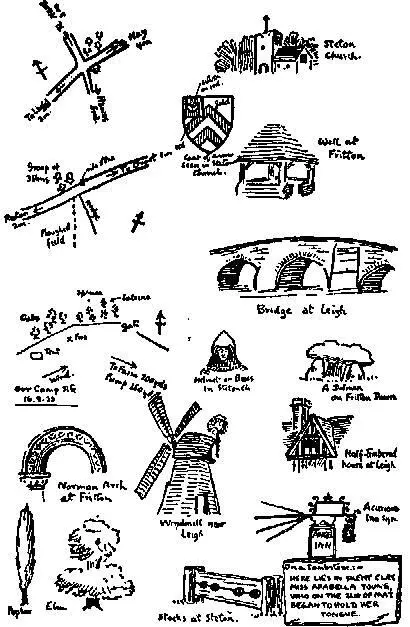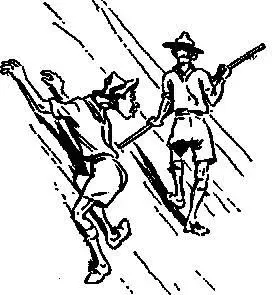Robert Robert - Scouting for Boys
Здесь есть возможность читать онлайн «Robert Robert - Scouting for Boys» весь текст электронной книги совершенно бесплатно (целиком полную версию без сокращений). В некоторых случаях можно слушать аудио, скачать через торрент в формате fb2 и присутствует краткое содержание. Жанр: Старинная литература, und. Описание произведения, (предисловие) а так же отзывы посетителей доступны на портале библиотеки ЛибКат.
- Название:Scouting for Boys
- Автор:
- Жанр:
- Год:неизвестен
- ISBN:нет данных
- Рейтинг книги:3 / 5. Голосов: 1
-
Избранное:Добавить в избранное
- Отзывы:
-
Ваша оценка:
- 60
- 1
- 2
- 3
- 4
- 5
Scouting for Boys: краткое содержание, описание и аннотация
Предлагаем к чтению аннотацию, описание, краткое содержание или предисловие (зависит от того, что написал сам автор книги «Scouting for Boys»). Если вы не нашли необходимую информацию о книге — напишите в комментариях, мы постараемся отыскать её.
Scouting for Boys — читать онлайн бесплатно полную книгу (весь текст) целиком
Ниже представлен текст книги, разбитый по страницам. Система сохранения места последней прочитанной страницы, позволяет с удобством читать онлайн бесплатно книгу «Scouting for Boys», без необходимости каждый раз заново искать на чём Вы остановились. Поставьте закладку, и сможете в любой момент перейти на страницу, на которой закончили чтение.
Интервал:
Закладка:

A clever Scout made these sketches for his exploring log or journal
Map Sketching
Also make a sketch-map. This does not need to be elaborate, as long as someone else can find his way by it. Be certain to include the north line and a rough scale.
Explorers, of course, keep a log or journal, giving a short account of each day’s journey, with simple drawings or photos of interesting things they see.
The Object of Your Expedition
As a rule you should have some object in your expedition: That is to say, if you are a Patrol of town boys, you would go off with the idea of scouting some special spot, say a mountain, or a famous lake, or possibly some old castle or battlefield, or a seaside beach. Or you may be on
your way to join one of the larger camps.
If, on the other hand, you are a Patrol from the country, you can make your way up to a big town, with the idea of seeing its buildings, its zoological gardens, circuses, museums, etc.
You would, of course, have to do your daily good turn whenever opportunity presented itself, but besides that, you should do good turns to farmers and others who may allow you the use of their barns and land, as a return for their kindness.
Mountaineering
Mountaineering is grand sport in many parts of the world. Finding your way and making yourself comfortable in the mountains bring into practice all your Scoutcraft.
In mountain climbing you are continually changing your direction, because, moving up and down in the deep gullies of the mountainside, you lose sight of the landmarks which usually guide you. You have to watch your direction by the sun and by your compass, and keep on estimating in what direction your proper line of travel lies.
Then again you are very liable to be caught in fogs and mists, which upset the calculations even of men who know every inch of the country.

On steep hill sides the Scout staff will often come in handy for balancing yourself.
Lost in the Mountains
I had such an experience in Scotland one year, when, in company with a Highlander who knew the ground, I got lost in the mist. Supposing that
he knew the way, I committed myself entirely to his guidance. But after going some distance I felt bound
to remark to him that I noticed the wind had suddenly changed. It had been blowing from our left when we started, and was now blowing hard on our right cheek. However, he seemed in no way disturbed and led on. Presently I remarked that the wind was blowing behind us, so that either
the wind, or the mountain, or we ourselves were turning round.
Eventually it proved, as I expected, that it was not the wind that had turned, nor the mountain. It was ourselves who had wandered round in a complete circle. We were back almost at the point
we started from.
Using Climbing Ropes
Scouts working on a mountain ought to practise the art of roping themselves together, as mountaineers do on icy slopes.
When roped together each man has about fourteen feet between himself and the next man. The rope is fastened round his waist, by a loop, with the knot on his left side. A loop takes up about 4 ft. 6 in. of rope, and should be a bowline at the ends of the rope, and a manharness knot for
central men on the rope.
Each man has to keep well back of the man in front of him, so that the rope is tight all the time. Then if one falls or slips, the others lean away from him with all their weight, and hold him up till he regains his footing.
Patrolling
Scouts go about Scouting as a Patrol or in pairs, or sometimes singly.
When patrolling, the Scouts of a Patrol seldom move close together. They spread out to see more country. Also, in this way, they will not all get caught if cut off or ambushed by the “enemy”.
A Patrol of six Scouts best moves in the shape of a kite with the Patrol Leader in the centre. No. 2 Scout is in front, Nos. 5 and 4 to the right and left, No. 3 to the rear, and No. 6 with the leader (No. 1) in the centre.
If there are eight in the Patrol, the Patrol Leader takes the Tenderfoot with him, No. 2 takes No. 6, and No. 3 takes No. 7.
Patrols going over open country where they are likely to be seen by enemies or animals should get across it as quickly as possible, by moving at Scout’s Pace, walking and running alternately for short spells of fifty paces from one point of cover to another. As soon as they are hidden in cover they can rest and look round before making the next move.
If you are the leading Scout and get out of sight ahead of your Patrol, you can bend branches of bushes or of reeds and grass every few yards, making the heads point forward to show your path. In this way the Patrol or anyone coming after you can easily follow and can judge from the freshness of the grass pretty well how long ago you passed. Besides, you can always find your way back again. Or you can make marks in the sand, or lay stones, or show which way you have gone by the signs which I have given you in Yarn No. 4.
Night Work
Scouts must be able to find their way equally well by night or by day. But unless they practise it frequently, they are very apt to lose themselves by night. Distances seem greater and landmarks are hard to see. Also you are apt to make more noise than by day, by accidentally treading on dry sticks or kicking stones.
If you are watching for an enemy at night, you have to trust much more to your ears than to your eyes. Your nose will also help you, for a Scout is well-practised at smelling out things. A man who has not damaged his sense of smell by smoking can often smell an enemy a good distance away. I have done it many times myself.
When patrolling at night, Scouts keep closer together than by day, and in very dark places, such as woods, they keep touch with each other in single file by each catching hold of the end of the next Scout’s staff.
When working singly in the dark, the Scout staff is most useful for feeling the way and pushing aside branches.
Scouts working apart from each other at night keep up communication by occasionally giving the call of their Patrol animal.
All Scouts should know how to guide themselves by the stars.
Finding the Way
Among the Red Indian scouts, the man who was good at finding his way in a strange country was termed a “pathfinder”. It was a great honour to be called by that name.
Many a “tenderfoot” has become lost in the veldt or forest, and has never been seen again, because he knew no scouting, nor had what is called “eye for the country”.
In one case a man got off a coach, which was driving through Matabeleland, while the mules were being changed, and walked off a few yards into the bush. When the coach was ready to start the drivers called for him in every direction, then searched for him. They followed the man’s
tracks as far as they could, in the very difficult soil of that country, but could not find him. At last, the coach, unable to wait any longer, continued its journey, after someone else had taken over the search.
Several weeks afterwards, the man was discovered, dead, nearly fifteen miles from where he had left the coach.
Don’t Get Lost
It often happens that when you are tramping alone through the bush, you become careless in noticing in what direction you are moving. You frequently change direction to get round a fallen tree, or over a rock or other obstacle and, having passed it, do not take up exactly the correct
Читать дальшеИнтервал:
Закладка:
Похожие книги на «Scouting for Boys»
Представляем Вашему вниманию похожие книги на «Scouting for Boys» списком для выбора. Мы отобрали схожую по названию и смыслу литературу в надежде предоставить читателям больше вариантов отыскать новые, интересные, ещё непрочитанные произведения.
Обсуждение, отзывы о книге «Scouting for Boys» и просто собственные мнения читателей. Оставьте ваши комментарии, напишите, что Вы думаете о произведении, его смысле или главных героях. Укажите что конкретно понравилось, а что нет, и почему Вы так считаете.

![Роберт Баден-Пауэлл - Искусство скаута-разведчика[Scouting for boys ; Искусство Разведки для мальчиков]](/books/70572/robert-baden-pauell-iskusstvo-skauta-thumb.webp)









